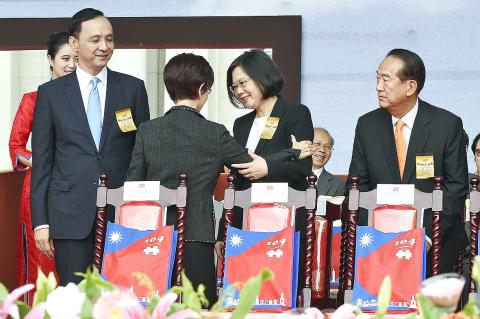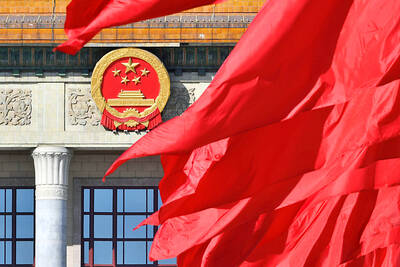The final Double Ten National Day ceremony of President Ma Ying-jeou’s (馬英九) time in office yesterday saw the attendance of the Democratic Progressive Party’s (DPP) Chairperson Tsai Ing-wen(蔡英文) for the first time in the past seven years; but Tsai, also the DPP’s presidential candidate, skipped a few words when singing the Republic of China (ROC) national anthem.
The ceremony saw leaders of the ruling and opposition parties, including Tsai and People First Party Chairman James Soong (宋楚瑜), sitting next to each other.
Not only was Tsai’s appearance considered a focal point, Chinese Nationalist Party (KMT) Chairman Eric Chu’s (朱立倫) interaction with KMT presidential candidate Hung Hsiu-chu (洪秀柱), who is widely expected to be replaced, was also expected to draw attention.

Photo: Chen Chih-chu, Taipei Times
Tsai said before the event that the nation is facing internal and external difficulties.
“The nation should stand together. The opposition party’s attendance at the Double Ten National Day ceremony should not be an issue any more,” she said, adding that democracy is an asset that needs to be safeguarded by all.
Tsai led a group of 23 DPP mayors, county commissioners, legislators and others holding public office.
The DPP members’ attendance at the ROC ceremony has always been contentious, considering the party’s pro-independence stance.
When singing the ROC anthem, Tsai kept her month shut on a few words, as the national anthem is also the KMT’s party anthem, with the lyrics including the phrase — “our party,” which Tsai omitted.
Tsai also did not applaud with the audience and Chu sitting next to her when Ma touted the “most stable cross-strait relations in 66 years” based on the so-called “1992 consensus” and called on the next president to adhere to the ROC Constitution, on which he said the “1992 consensus” is based.
The “1992 consensus” refers to a tacit understanding between the KMT and the Chinese government that both sides acknowledge there is “one China,” with each side having its own interpretation of what “China” means.
The event was the first public setting at which Chu and Hung met face to face since the KMT’s Central Standing Committee meeting on Wednesday, at which an extraordinary party congress was mooted to determine the fate of Hung as the party’s presidential candidate.
The two were said to have exchanged telephone messages since, but had not met until yesterday.
Hung said before the ceremony that she would not feel “awkward” upon seeing Chu, adding that “surely I would say hello to Tsai; it is not like we are enemies.”
Hung was prearranged to sit directly behind Chu on the stage, who later said it was hard for him to “turn and talk to her” after reports said the interaction between the duo was “rather cold.”
Chu and Tsai, on the other hand, had what the media called “warm exchanges.”
The two party leaders sat right next to each other and were seen conversing from time to time.
Chu said after the event that he and Tsai talked about “hope for better interaction between the ruling and opposition parties” and the enhancement of the “democracy of our generation.”

US PUBLICATION: The results indicated a change in attitude after a 2023 survey showed 55 percent supported full-scale war to achieve unification, the report said More than half of Chinese were against the use of force to unify with Taiwan under any circumstances, a survey conducted by the Atlanta, Georgia-based Carter Center and Emory University found. The survey results, which were released on Wednesday in a report titled “Sovereignty, Security, & US-China Relations: Chinese Public Opinion,” showed that 55.1 percent of respondents agreed or somewhat agreed that “the Taiwan problem should not be resolved using force under any circumstances,” while 24.5 percent “strongly” or “somewhat” disagreed with the statement. The results indicated a change in attitude after a survey published in “Assessing Public Support for (Non)Peaceful Unification

The CIA has a message for Chinese government officials worried about their place in Chinese President Xi Jinping’s (習近平) government: Come work with us. The agency released two Mandarin-language videos on social media on Thursday inviting disgruntled officials to contact the CIA. The recruitment videos posted on YouTube and X racked up more than 5 million views combined in their first day. The outreach comes as CIA Director John Ratcliffe has vowed to boost the agency’s use of intelligence from human sources and its focus on China, which has recently targeted US officials with its own espionage operations. The videos are “aimed at

‘MISGUIDED EDICT’: Two US representatives warned that Somalia’s passport move could result in severe retaliatory consequences and urged it to reverse its decision Minister of Foreign Affairs Lin Chia-lung (林佳龍) has ordered that a special project be launched to counter China’s “legal warfare” distorting UN Resolution 2758, a foreign affairs official said yesterday. Somalia’s Civil Aviation Authority on Wednesday cited UN Resolution 2758 and Mogadishu’s compliance with the “one China” principle as it banned people from entering or transiting in the African nation using Taiwanese passports or other Taiwanese travel documents. The International Air Transport Association’s system shows that Taiwanese passport holders cannot enter Somalia or transit there. The Ministry of Foreign Affairs (MOFA) protested the move and warned Taiwanese against traveling to Somalia or Somaliland

SECURITY: Grassroots civil servants would only need to disclose their travel, while those who have access to classified information would be subject to stricter regulations The government is considering requiring legislators and elected officials to obtain prior approval before traveling to China to prevent Chinese infiltration, an official familiar with national security said yesterday. President William Lai (賴清德) in March announced 17 measures to counter China’s growing infiltration efforts, including requiring all civil servants to make trips to China more transparent so they can be held publicly accountable. The official said that the government is considering amending the Act Governing Relations Between the People of the Taiwan Area and Mainland Area (臺灣地區與大陸地區人民關係條例) to require all civil servants to follow strict regulations before traveling to China.